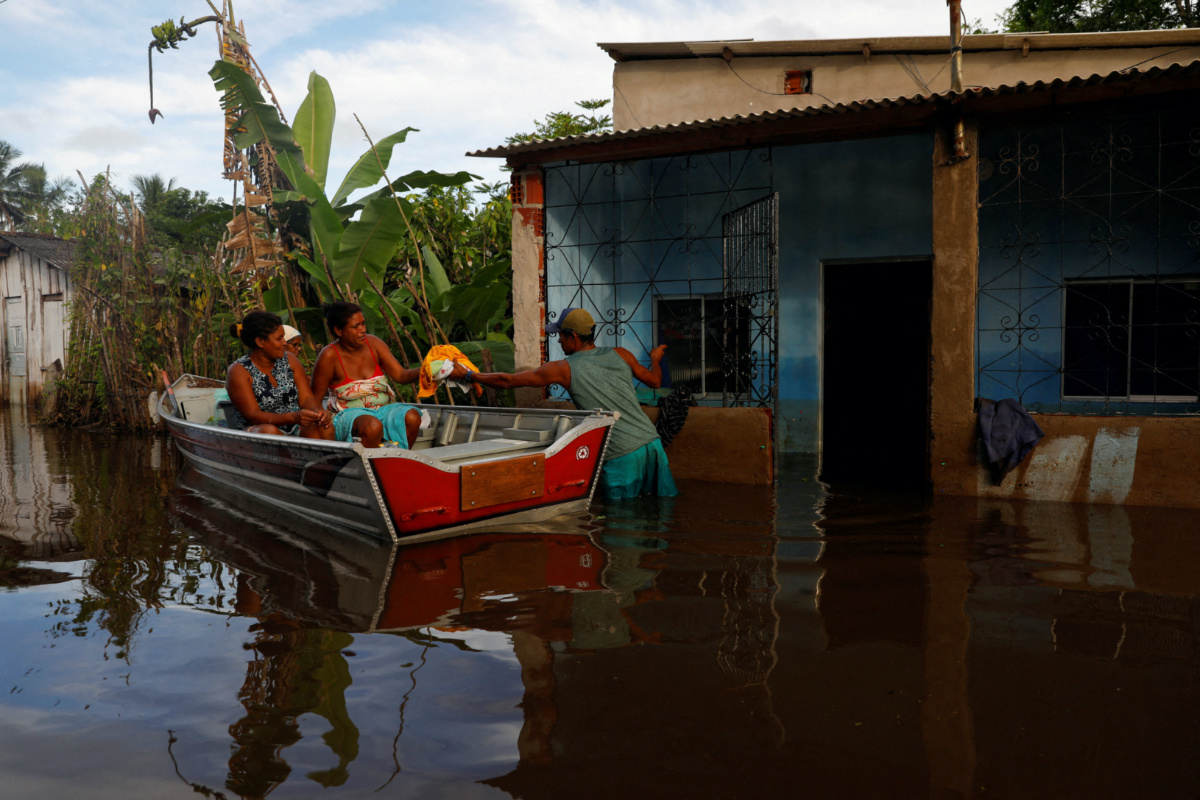London, UK
Thomson Reuters Foundation
Governments are struggling to adopt climate-smart policies as COVID-19 hits economic activity and forces them to focus instead on tackling surging social inequality, the World Economic Forum said on Tuesday.
Failure to implement emissions-cutting pledges and the “dramatic consequences” in terms of devastating floods, storms and wildfires are now the world’s biggest threats, the group’s annual risks report found.
“Our planet is on fire and we have to deal with this. This is a risk we really, really know. We cannot say we are faced with a blind spot,” WEF President Borge Brende said in an online news conference about the survey.

Sergio da Silva dos Santos hands clothes to other residents in front of a flooded house accessed by canoe at Sambaituba in Ilheus, Bahia state, Brazil, on 29th December. PICTURE: Reuters/Amanda Perobelli/File photo.
Threats to social cohesion, such as widening income and wealth inequality and huge differences in access to vaccines around the world, emerged as another major worry in the WEF poll of nearly 1,000 business, government and academic leaders.
They said an increase in such threats and the need of governments to prioritise urgent, pandemic-related problems were hampering efforts to switch to a low-carbon economy to fight climate change.
In particular, concerns about achieving a “just transition” to a climate-smart economy are growing as workers and communities dependent on fossil fuel industries or subsidies object to changes they see as unfair.
“Governments have a balancing act to work with,” said Saadia Zahidi, WEF managing director, referring to the need to revive economies while protecting jobs, dealing with health threats and achieving a green economic transition.
Rising geopolitical tensions – over everything from vaccine distribution to responsibility to act on climate threats – also make winning global cooperation to tackle big threats harder, Brende said.
When it comes to climate change, “are those solutions going to be developed in this fractured world? Let’s see,” he said.
Environmental threats dominated the risks seen as most severe over the next decade, with climate action failure, extreme weather and biodiversity loss at the top of the list.
Those threats, alongside natural resources crises and human environmental damage, also took all top five slots in the rankings of top risks over the next five to 10 years.
Close behind were threats from social cohesion erosion and involuntary migration, which are also linked to climate change pressures.
Carolina Klint, risk management leader for continental Europe at Marsh McLennan, a risk analysis firm, said the perception of climate risks is growing as impacts hit key infrastructure, crop production and more urban areas.
But she said there were signs pressure was growing on companies and governments to act on their climate commitments, from new activist company shareholders to closer monitoring by investors, civil society groups and consumers.
Peter Giger, group chief risk officer for Zurich Insurance Group, said efforts by companies to “greenwash” their behavior – or paint actions as more climate friendly than they are – would only lead to more “radical” regulations if climate action fails.
The best ways to speed action on climate threats include setting a carbon price to reflect the true cost of fossil fuel use and correcting the “historic and deliberate mispricing of carbon”, he said.
As rising debt levels, higher commodity prices and inflation hit economies around the world and make it harder for governments to act, businesses will have to help drive the transition, he said.
Getting government policies on cutting fossil fuels in place can take too much time, he said, and “governments are focused on preserving the status quo”, which means “I don’t expect governments to lead on this”.





